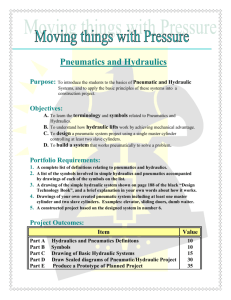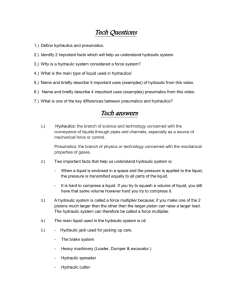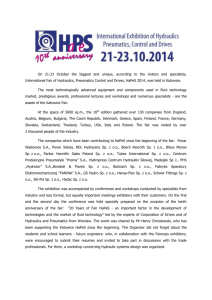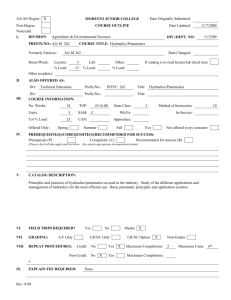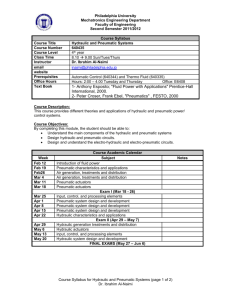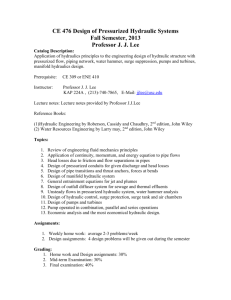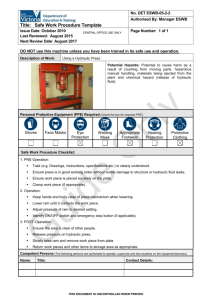Drexel University Goodwin College of Professional Studies
advertisement
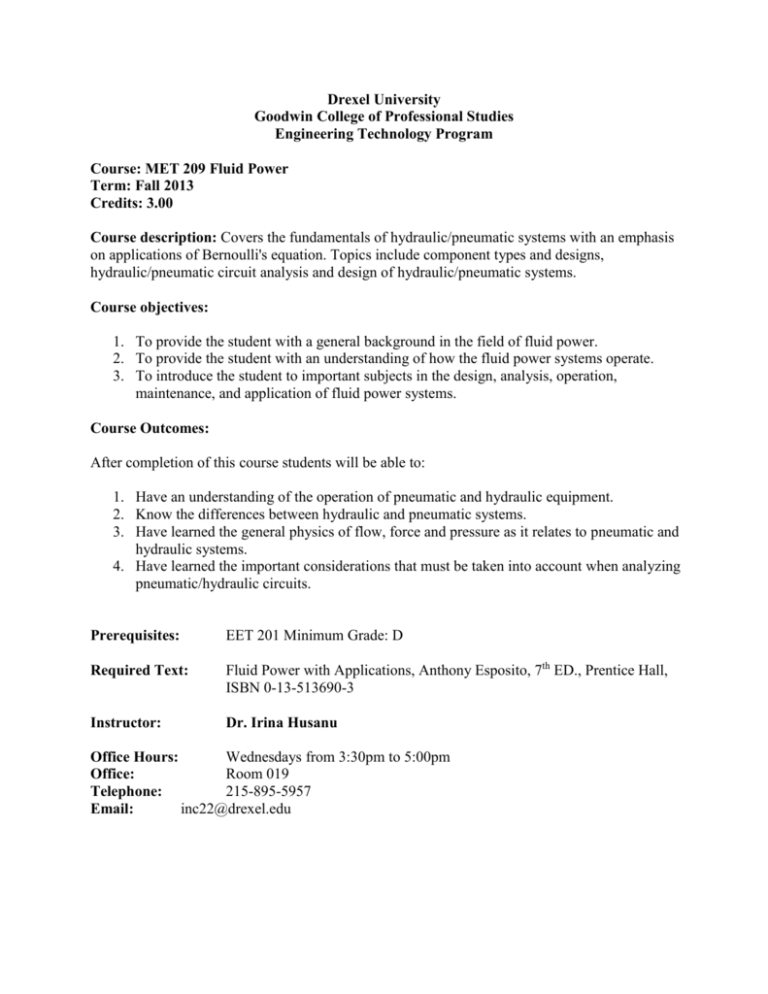
Drexel University Goodwin College of Professional Studies Engineering Technology Program Course: MET 209 Fluid Power Term: Fall 2013 Credits: 3.00 Course description: Covers the fundamentals of hydraulic/pneumatic systems with an emphasis on applications of Bernoulli's equation. Topics include component types and designs, hydraulic/pneumatic circuit analysis and design of hydraulic/pneumatic systems. Course objectives: 1. To provide the student with a general background in the field of fluid power. 2. To provide the student with an understanding of how the fluid power systems operate. 3. To introduce the student to important subjects in the design, analysis, operation, maintenance, and application of fluid power systems. Course Outcomes: After completion of this course students will be able to: 1. Have an understanding of the operation of pneumatic and hydraulic equipment. 2. Know the differences between hydraulic and pneumatic systems. 3. Have learned the general physics of flow, force and pressure as it relates to pneumatic and hydraulic systems. 4. Have learned the important considerations that must be taken into account when analyzing pneumatic/hydraulic circuits. Prerequisites: EET 201 Minimum Grade: D Required Text: Fluid Power with Applications, Anthony Esposito, 7th ED., Prentice Hall, ISBN 0-13-513690-3 Instructor: Dr. Irina Husanu Office Hours: Wednesdays from 3:30pm to 5:00pm Office: Room 019 Telephone: 215-895-5957 Email: inc22@drexel.edu Course Outline Week Topic Chapter/Sections 1 Introduction to Fluid Power; Physical properties of hydraulic fluids Ch 1; Ch 2: Sec. 1-5 2 Energy and Power Hydraulic Systems Hydraulic and Pneumatic Valves 3 Hydraulic and Pneumatic circuits Pneumatic circuits and applications 4 Hydraulic and Pneumatic circuits Ch. 3 -4 Ch. 8, 13, and 14 selected sections Ch 9 and 13 (selections) Ch 14: Sec. 7-8 Ch 9 and 14 (selections) 5 Hydraulic Circuit Design and Analysis Midterm Exam Ch 9 and 14 (selections) 6 Hydraulic Pumps and Motors Ch 5 and 7 7 Hydraulic Cylinders Ch 6 8 Labs 9 Labs 10 11 Labs Final Examination Laboratory Activity Basic Pneumatics Lap 1 and 2 Hydraulics Lap 1 Basic Pneumatics Lap 1 and 2 Hydraulics Lap 1 Basic Pneumatics Lap 3 Hydraulics Lap 2 Basic Pneumatics Lap 4 Hydraulics Lap 3 Basic Pneumatics Lap 4 Hydraulics Lap 3 Intermediate Pneumatics Lap 1 Hydraulics Lap 4 Intermediate Pneumatics Lap 1 Hydraulics Lap 4 Intermediate Pneumatics Lap 2 Hydraulics Lap 5 Intermediate Pneumatics Lap 2 Hydraulics Lap 5 Engineering Technology Course: MET 209 Student Learning Outcomes (SLOs) Aligned with ABET Student Outcomes (a-k) ABET Student Outcomes1 a b c d e f g h i SLO 1: Have an understanding of the operation of pneumatic and hydraulic equipment. X X X X X SLO 2: Know the differences between hydraulic and pneumatic systems. X X X X X Have learned the general physics of flow, force and X X X X X X pressure as it relates to pneumatic and hydraulic systems. Have learned the important SLO considerations that must be 4: X X X X X X taken into account when analyzing pneumatic /hydraulic circuits. Upon successful completion of this program, students will attain the following outcomes: SLO 3: a. b. c. d. e. f. g. h. i. j. k. j k X X an ability to select and apply the knowledge, techniques, skills, and modern tools of the discipline to broadly-defined engineering technology activities; an ability to select and apply a knowledge of mathematics, science, engineering, and technology to engineering technology problems that require the application of principles and applied procedures or methodologies; an ability to conduct standard tests and measurements; to conduct, analyze, and interpret experiments; and to apply experimental results to improve processes; an ability to design systems, components, or processes for broadly-defined engineering technology problems appropriate to program educational objectives; an ability to function effectively as a member or leader on a technical team; an ability to identify, analyze, and solve broadly-defined engineering technology problems; an ability to apply written, oral, and graphical communication in both technical and nontechnical environments; and an ability to identify and use appropriate technical literature; an understanding of the need for and an ability to engage in self-directed continuing professional development; an understanding of and a commitment to address professional and ethical responsibilities including a respect for diversity; a knowledge of the impact of engineering technology solutions in a societal and global context; a commitment to quality, timeliness, and continuous improvement. Grading Policy: All examinations will be open book, closed notes. Failure to take an examination when scheduled will result in a grade of zero for that examination unless a medical certificate is produced. There will be no exceptions to this rule. If the absence from an examination is excused for medical reasons, the term grade will be computed by increasing the worth of the final examination. Any questions about examination grading must be raised within a week after the return of the exam or assignment. The solutions for the homework will be published within a day of the class period after the due date. Late homework will be penalized at the rate of 10% per week. The final course grade will be computed on the following basis: Attendance Homework Laboratory Reports and Activity Midterm exam (1 ½ hour) Final Exam (2 hours) Evaluations: Course Requirements Attendance Homework Project Laboratory activity Midterm exam Final exam Course Grading Percentages 5% 5% N/A 40% 25% 25% 5% 5% 40% 25% 25% Grading Scale 97-100: A+ 93-96: A 90-92: A67-69: D+ 60-66: D 87-89: B+ 83-86: B 80-82: B59-below F 77-79: C+ 73-76: C 70-72: C- Course Policies: Attendance/Participation: As a student in this course, it is expected that you will actively participate in laboratory activities and complete assignments on time. Assignments are due no later than the assigned due date. Presentation: The primary mode of instruction will be lectures, followed by laboratory activities and homework. Students will be expected to read all assignments in the textbook, as well as any supplemental materials assigned relating to various topics. Laboratory Activities: Please read and print your laboratory handout prior coming to class. The lab handout is published in BB Vista page of your course along with any supplemental material that you need for class and/or homework. There will be no printed handout given to you by the instructor in class. It is your responsibility to print the handout. Exams: There will be one midterm exam of 1 and 1/2 hour and a 2 hour final exam. Details of these will be discussed prior to the tests. Make-Up Exam: No make-up exams will be given. In case of hardships and emergencies, you need to contact me prior to the exam and arrange for documented proof of your situation. Students are encouraged to discuss their instructional and accommodation needs with their professors early in the semester. Extra Credit: There will be NO work to be performed for extra credit. Americans with Disabilities Act: Student with disabilities requesting accommodations and services at Drexel University need to present a current accommodation verification letter (AVL) to faculty before accommodations can be made. AVL's are issued by the Office of Disability Services (ODS). For additional information, contact ODS at www.drexel.edu/ods , 3201 Arch St., Street, Suite 210, Philadelphia, PA 19104, 215.895.1401 (V), or 215.895.2299 (TTY). Academic Honesty Policy: Drexel University is committed to a learning environment that embraces academic honesty. In order to protect members of our community from results of dishonest conduct, the University has adopted policies to deal with cases of academic dishonesty. Please read, understand, and follow the “Academic Honesty Policy” as written in the Official Student Handbook: http://www.drexel.edu/provost/policies/academic_dishonesty.asp. By placing his/her name on work submitted for credit, the student certifies the originality of all work not otherwise identified by appropriate acknowledgments. Drexel's policies to address violations are found at: http://www.drexel.edu/judicial/honesty.html Student’s Responsibilities: Course Evaluation: Your feedback about the course and instructor is the only way instructors and academic units can improve the quality of a course and its content. Courses administered by the Goodwin College are evaluated electronically via the Online Course Evaluation System. Students will receive all necessary information via email by the 8th week of classes (or by the 4th week of classes in case of accelerated courses). The evaluations are entirely confidential and will preserve your anonymity. Dropping a course or withdrawing from a course: Once a student is registered, it is his/her responsibility to attend the course, drop the course, or withdraw from the course. Dropping and withdrawing are distinct actions governed by different policies and impact a student’s course enrollment status. Dropping a course causes the name of the course to disappear from the student’s transcript. Withdrawing from a course causes both the name of the course and the grade of “W” to appear on the student’s transcript. Before withdrawing from a course, students should consult the instructor. In either case, a signed form is required. There are billing consequences and academic record impact during this process; therefore, the student must attend to the proper procedure when dropping or withdrawing from a course. All students must obtain the instructor’s and the Academic Advisor’s signature on the “Add/ Drop/Withdraw” form, which is available online at http://www.drexel.edu/provost/src/forms.asp or in the lobby of Goodwin College. Financial/academic record impact for Drop/Withdrawal: Dropping or withdrawing from courses can have serious financial and academic implications, possibly affecting billing, financial aid, VA benefits, eligibility to participate in NCAA athletic events, and for foreign students, immigration status. Students are strongly encouraged to consult with their Academic Advisor and financial aid counselor before withdrawing. Students are considered the responsible parties for any/all transactions processed against their academic record. Drop/Withdraw Policies and Procedures To drop or withdraw a course for which you have paid or contracted: Complete drop/withdraw form and obtain instructor and Academic Advisor signatures Either give the form to your Academic Advisor or fax to 215.895.4988 Notify your funding source (if appropriate) 6-week course REFUND SCHEDULE Full quarter course Tuition Refund 100% Before 1st class session Before 1st class session begins begins Start of 1st class meeting until The first two calendar weeks 100% the following Friday of class Start of 2nd class meeting until Week three 50% the following Friday N/A Week four and five 25% Start of 3rd class meeting until Week six 0% the following Friday As shown above, withdrawal has financial and academic implications. Record Impact No Record No Record “W” on Record “W” on Record “W” on Record Please note: Whenever you add, drop, or withdraw from a course, please check your schedule in Banner Web to verify that your transaction was successful. This is very important! Ultimate responsibility for proper course adjustment rests with the student. Financial Obligations: Students who do not satisfy financial obligations to Drexel University are not entitled to a grade by the instructor or the University. Incomplete Policy: If the student requests an incomplete (I) or no-credit (NC) grade, it is the student’s responsibility to make sure she/he meets the University criteria and deadlines for requesting these grades. If the student stops attending the class, she/he will not be automatically dropped from the course and she/he will receive a grade according to her/his overall performance. It is the student’s responsibility to make sure that she/he is properly enrolled or de-enrolled in the course. The instructor reserves the right to make changes to this syllabus if circumstances warrant such change. All changes will be provided to students in writing.
